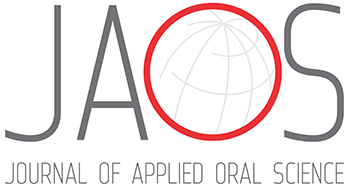Marginal integrity is one of the most crucial aspects involved in the clinical longevity of resin composite restorations.
Objective
To analyze the marginal integrity of restorations produced with a model composite based on polyhedral oligomeric silsesquioxane (POSS).
Material and Methods
A base composite (B) was produced with an organic matrix with UDMA/TEGDMA and 70 wt.% of barium borosilicate glass particles. To produce the model composite, 25 wt.% of UDMA were replaced by POSS (P25). The composites P90 and TPH3 (TP3) were used as positive and negative controls, respectively. Marginal integrity (%MI) was analyzed in bonded class I cavities. The volumetric polymerization shrinkage (%VS) and the polymerization shrinkage stress (Pss - MPa) were also evaluated.
Results
The values for %MI were as follows: P90 (100%) = TP3 (98.3%) = B (96.9%) > P25 (93.2%), (p<0.05). The %VS ranged from 1.4% (P90) to 4.9% (P25), while Pss ranged from 2.3 MPa (P90) to 3.9 MPa (B). For both properties, the composite P25 presented the worst results (4.9% and 3.6 MPa). Linear regression analysis showed a strong positive correlation between %VS and Pss (r=0.97), whereas the correlation between Pss and %MI was found to be moderate (r=0.76).
Conclusions
The addition of 25 wt.% of POSS in methacrylate organic matrix did not improve the marginal integrity of class I restorations. Filtek P90 showed lower polymerization shrinkage and shrinkage stress when compared to the experimental and commercial methacrylate composite.
Composite resins; Dental marginal adaptation; Dental stress analysis






